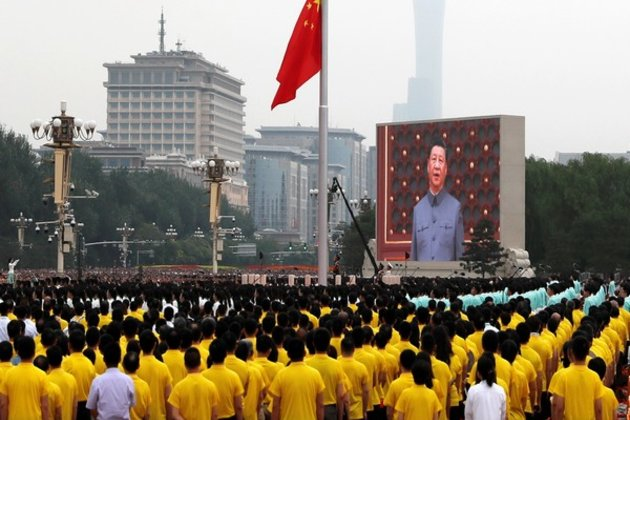Forced Labor is the “Hidden Cost” of China’s BRI

Forced labor is the “hidden cost” of China’s Belt and Road initiatives, says the US State Department’s latest report that ranks the country with the world’s worst human trafficking record.
Chinese citizens employed under some of the Belt and Road projects, as well as nationals of countries hosting the projects, have undergone fraudulent recruitment, resulting in debt slavery, wage withholding, illegal contracts, travel and identity documents seized, says the report on human trafficking released in Washington.
U.S. Secretary of State Blinken cited the example of Zhang Qiang, a Chinese worker, at the launch of the report: Zhang Qiang went to Indonesia last year to work in the “Belt and Road” project, but after his passport was taken away, he was required to sign a contract that was lower than the wages promised to him and worked longer hours. After unsuccessfully appealing to the Chinese Embassy in Indonesia, he smuggled himself into Malaysia, but was arrested by Malaysian authorities, and the latest reports suggest he will be deported back to China.
“All countries should be able to pursue development opportunities without sacrificing respect for human rights,” the report said, “countries that are interested in Belt and Road projects or are currently working on Belt and Road projects must ensure that their citizens, Chinese nationals and other migrant workers are protected from human trafficking.”
“If Belt and Road projects employ local workers, host governments must review recruitment channels and recruitment contracts to ensure that their citizens are not deceived and exploited under false pretense,” the report added.
There are currently nearly 25 million victims of human trafficking worldwide.
While on China, the report noted that the Communist Country had taken some steps to address human trafficking, and said Cinna still has “a policy or pattern of pervasive forced labor,” including continued mass arbitrary detentions of Uighurs and other Muslim minorities in Xinjiang under the pretext of “vocational training” and “de-radicalization,”
Authorities continue to implement these policies in other provinces and use surveillance, harassment, and threats to seek forced repatriation and detention of religious minorities living abroad.
The report also noted that Chinese authorities have failed to adequately monitor recruitment channels, contracts and labor conditions at a time when Chinese nationals are allegedly subjected to forced labor in belt and road projects in some countries, and that China’s diplomatic service has failed to detect these problems and to help those who are exploited.####
- Courtesy VOA
-
Book Shelf
-
 Book Review
DESTINY OF A DYSFUNCTIONAL NUCLEAR STATE
Book Review
DESTINY OF A DYSFUNCTIONAL NUCLEAR STATE
- Book ReviewChina FO Presser Where is the fountainhead of jihad?
- Book ReviewNews Pak Syndrome bedevils Indo-Bangla ties
- Book Review Understanding Vedic Equality….: Book Review
- Book Review Buddhism Made Easy: Book Review
- Book ReviewNews Elegant Summary Of Krishnamurti’s teachings
- Book Review Review: Perspectives: The Timeless Way of Wisdom
- Book ReviewNews Rituals too a world of Rhythm
- Book Review Marx After Marxism
- Book Review John Updike’s Terrorist – a review
-
-
Recent Top Post
-
 Commentaries
Impasse over BRI Projects in Nepal
Commentaries
Impasse over BRI Projects in Nepal
-
 CommentariesNews
Yet another Musical Chairs in Kathmandu
CommentariesNews
Yet another Musical Chairs in Kathmandu
-
 CommentariesTop Story
Spurt in Anti-India Activities in Canada
CommentariesTop Story
Spurt in Anti-India Activities in Canada
-
 NewsTop Story
Nepal: Political Stability Under Threat Again
NewsTop Story
Nepal: Political Stability Under Threat Again
-
 NewsTop Story
Accountability Tryst With 2024 Ballot….
NewsTop Story
Accountability Tryst With 2024 Ballot….
-
 NewsTop Story
What Would “Total Victory” Mean in Gaza?
NewsTop Story
What Would “Total Victory” Mean in Gaza?
-
 CommentariesTop Story
The Occupation of Territory in War
CommentariesTop Story
The Occupation of Territory in War
-
 CommentariesTop Story
Pakistan: Infighting in ruling elite intensifies following shock election result
CommentariesTop Story
Pakistan: Infighting in ruling elite intensifies following shock election result
-
 CommentariesTop Story
Proforma Polls in Pakistan Today
CommentariesTop Story
Proforma Polls in Pakistan Today
-
 CommentariesTop Story
Global South Dithering Away from BRI
CommentariesTop Story
Global South Dithering Away from BRI
-
AdSense code



















